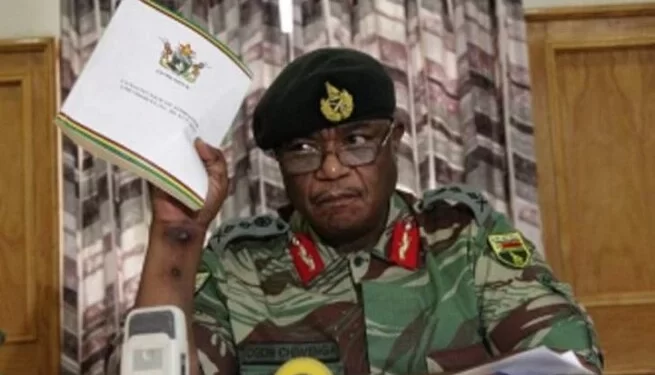Vice-President Constantino Chiwenga’s strong military connections continue to raise concerns about the potential for a securitized governance structure in Zimbabwe.
Despite transitioning from military to civilian life six years ago, Chiwenga’s enduring ties to the military have sparked fears that he could transform the country into a fully-fledged securocratic state if he were to assume the presidency.
Chiwenga’s illustrious military career, which culminated in his appointment as Commander of the Zimbabwe Defence Forces in 2003, earned him widespread recognition. He emerged as a prominent figure during the November 2017 coup that ousted the late former President Robert Mugabe, after which he retired from the army to take on the role of Vice-President.
As President Emmerson Mnangagwa nears the end of his constitutional term, Chiwenga, by virtue of his position, appears to be in a prime position to succeed him. However, doubts have been cast on Chiwenga’s ability to establish a strong political base within the ruling Zanu PF party, raising questions about his capacity to govern solely through traditional political channels.
Nevertheless, Chiwenga’s recent marriage to Colonel Miniyothabo Chiwenga showcased his enduring influence within the Southern African Development Community (Sadc) region. The wedding ceremony saw former Namibian retired military commander Epaphras Denga Ndaitwah serving as Chiwenga’s best man, alongside esteemed guests such as Senate Deputy President General (Rtd) Mike Nyambuya, Commander of the Zimbabwe National Army Lieutenant General Anselem Sanyatwe, and Air Marshal (Rtd) Shebba Shumbayawonda.
Ndaitwah emphasized Chiwenga’s seniority and influence within Sadc military circles, underscoring the continued significance of his military connections.
Political analyst Romeo Chasara from Witwatersrand University expressed concerns about the potential implications of a president closely aligned with the military. He warned that such an alignment could jeopardize Zimbabwe’s fragile democracy by eroding the independence of key institutions such as the Judiciary, Legislature, and media. Given the military’s historical involvement in crackdowns on opposition voices, there are fears that under a securocratic state, such practices could become more frequent.
Herbert Chamuka, leader of the People’s Unity Party, echoed these concerns, citing past instances of military involvement in political affairs, including crackdowns on dissent and intimidation of the opposition. He cautioned that under a Chiwenga presidency, there is a risk of returning to a dark chapter where civilian authority is undermined and fundamental rights are trampled upon.
Particular attention is being drawn to the potential impact on the Judiciary and media, which are crucial pillars of any functioning democracy. A securocratic state led by Chiwenga could exert increased pressure on these institutions to align with the military’s interests, stifling independent scrutiny and silencing critical voices.
Political analyst Vivid Gwede acknowledged that it is not uncommon for individuals like Chiwenga, with military backgrounds, to have connections within regional militaries due to institutional exchanges. However, he cautioned that if Chiwenga were to ascend to the presidency, there is a significant likelihood that the country would maintain a status quo of a securocratic and militarized state. Gwede did acknowledge that some former generals in other countries have successfully implemented democratic governance, citing examples such as Nigeria’s Obasanjo and Buhari.
With concerns mounting over the potential consequences of Chiwenga’s military ties, Zimbabwe finds itself at a crucial juncture where the future path of governance and democracy hangs in the balance. As the political landscape evolves, it remains to be seen how these dynamics will play out and shape the nation’s future.
Source MyZimbabwe










